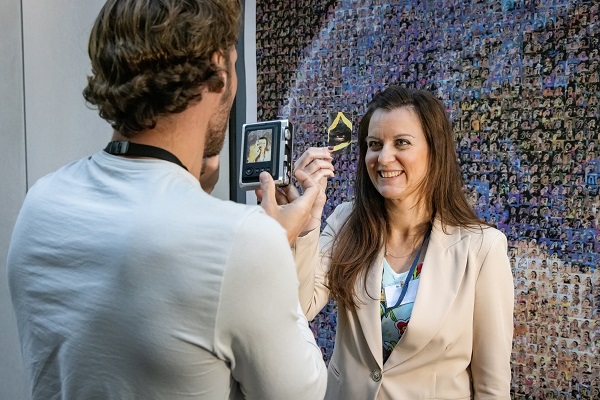 Francesca Messini, Sustainability Leader at Deloitte, pictured at MOMENTUM 2024;
Credit: Deloitte Luxembourg
Francesca Messini, Sustainability Leader at Deloitte, pictured at MOMENTUM 2024;
Credit: Deloitte Luxembourg
On Thursday 18 April 2024, Deloitte Luxembourg hosted the annual MOMENTUM Conference at its premises in Luxembourg-Gasperich.
This year's agenda invited established changemakers and leaders from prominent companies, Luxembourg's Ministry of the Environment, Climate and Biodiversity and European institutions in Luxembourg to reimagine, innovate and collaborate around what is possible for the future. As reported by the organisers, MOMENTUM served, for the third year in a row, as "a platform for meaningful conversations, energizing ideas, and inspiring solutions to advance sustainability initiatives."
"It's time we translate words into actions. Sustainability is not about clichés or empty promises; it's a steadfast commitment that transforms through tangible actions," said Francesca Messini, Sustainability Leader at Deloitte Luxembourg. "We must leverage our knowledge, expertise and resources to drive positive change. Deloitte calls upon all stakeholders to embrace the challenge and take bold steps towards a better, sustainable future."
The conference, moderated by Luxembourgish changemaker Jana Degrott, facilitated discussions through three distinct panels, each dedicated to a specific theme.
Panel #1: Ensuring an equitable & just transition in finance
The first panel, led by Julien Froumouth, Head of Sustainability of ABBL, kicked off the conference with discussions about the integration of sustainability in finance and the role of financial institutions in supporting a sustainable future. Participants delved into the challenges private markets face when directing financial flows towards a green transition and the steps organisations need to take to define credible financial plans. The panel also stressed the importance of international financial institutions striking a strategic balance between preventing greenwashing and actively supporting a low-carbon economy. As the panel drew to a close, the experts underlined how stricter regulations and closer collaboration between policymakers and industry stakeholders will be key to accelerating progress towards sustainability.
Panel #2: Supporting economic growth beyond the EU
Led by Nicoletta Centofanti, CEO of the Luxembourg Sustainable Finance Initiative, the second panel explored the opportunities and challenges associated with promoting global sustainable growth. From green and climate finance activities to the challenges of transitioning to a green growth model, the speakers explored important considerations when trying to reach low-income and vulnerable communities. This included the mobilisation of financial resources, the role of taxonomies in scaling up green finance and the collaboration between multilateral development banks (MDBs) and international organisations.
Panel #3: Synergising our commitments for real change
Following a short break, the conference continued with a session on how business strategies are impacted by sustainability efforts. Moderated by Michael Halling, Professor and Chair in Sustainable Finance of the University of Luxembourg, this discussion shed light on the growing importance of sustainability in shaping business agendas. Industry leaders shared steps taken to align their organisations with sustainable practices from environmental, social and governance (ESG) perspectives. The panellists highlighted the need for robust commitments and effective governance structures to navigate challenges and make sustainable progress. Discussions also touched upon the acceleration needed in respective sectors to meet the Paris Agreement targets and COP28 commitments, with participants envisioning their businesses as sustainable entities a decade from now.
The programme ended with a TED-style talk by Ed Gillespie, co-founder of Futerra, keynote speaker, writer, serial entrepreneur and futurist, who said: "Why are we in so much trouble? Partly, it's because our willingness to act is inversely proportionate to the impact of our actions. We are living through a generational acceleration, and the planet is starting to send back invoices to the economy, calling back that ecological debt." He continued: "The best way to attack climate chaos is to address inequalities in all ways, shapes or forms - whether it's based on gender, ethnicity, disability or income - that's going to make for a much more resilient world". He went on to list the six things businesses can focus on to make a real cultural change: "We need strong leadership, maintaining belief in the possibility of change, governance at the right level in our organisation to make bolder decisions, closing the huge implementation vs expectations gap, decarbonisation investments, and working with all suppliers in the supply chain."
MOMENTUM not only focused on the larger players but also paid attention to the smaller, local entities. Various NGOs were present, giving attendees the opportunity to interact with organisations like Dress for Success, Foundation Follereau Luxembourg and Serve the City.
The event (a certified "Green Business Event") closed with a networking cocktail, where attendees could continue discussing conference takeaways amid Thomas Iser's art project, "Universal Humanity.”








